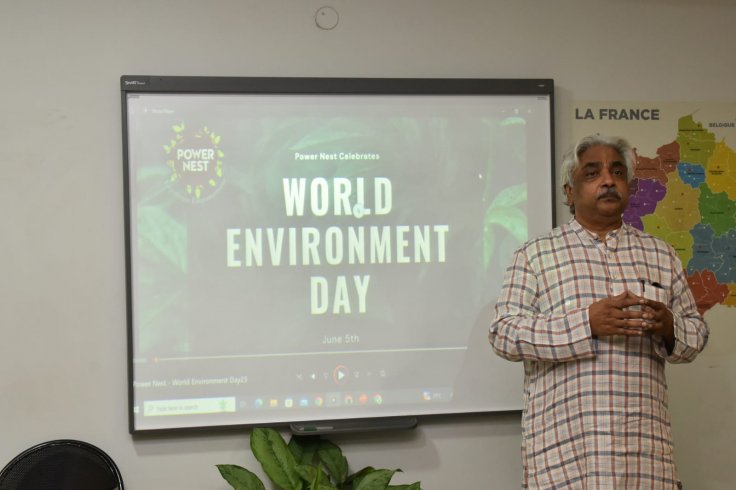Participants asked questions. A board game provided the answers in a unique Environment Day celebration organised by NGO Power Nest at Alliance Francaise in Bangalore, India.
How can we use plastic in a better way? Why have I/we not been able to reuse plastic? How can I move towards living in natural surroundings like a forest, asked the audience comprising teachers, students and educators. To author and artist Dr Premraj's question on why we are not able to reuse plastic effectively, the card drawn asked him point blank if he was a follower or leader, setting off some reflection. To another question on 'why I am not responsible in the reuse of plastic' he drew a blank card, with the doctor confessing that he has not done anything about it.
The 'flowgame' is basically a tool to generate interactive reflection, dialogue and action, something crucial in the environmental crisis today. Developed in the 90s in Denmark by a group of professionals committed to environment, peace and participation, the flowgame is based on a North American aboriginal medicine wheel.

(A player focusses on his/her question and rolls the dice. The four directions or Heaven or Earth are the choices that come up and the player then 'randomly' picks a card from the said stack. The card then poses a question back at the questioner. This question is then answered by all the participants and in the process provides refreshing perspectives to the original question.)
Host Arvind Shivakumar who guided the participants in the game, has been working in the wellness and well-being spaces, besides having spent a decade working in Greenpeace.
The need for collective action was also the call by most speakers at the event. Zafer Mohiuddin, President of Alliance Francaise in Bangalore, quoted renowned Urdu poet Kaifi Azmi, to say,
shor yuhi na parindon ne machaya hoga,
koi jungle ki taraf sheher se aaya hoga
ped ko kaatnewaalo ko ye maalum tho tha,
jism jal jayenge jab sar pe saaya na hoga
The powerful lines talk of how man has been behind much of environmental destruction and continues to do so, despite knowing the consequences. "We are cutting trees to build roads and high rises, we kill insects which are so useful in their roles. We have no right to do it but we are greedy and interfering disastrously in the environment," he noted while adding that at AFB premises, care has been taken to keep it green and encourage all the natural life in it.

Saving Ourselves
Architect Ravindra Kumar, who has a lot of experience working on IGBC sustainable smart buildings, residential, commercial and industrial parks, spoke of how after having worked as a youth on an alternate habitat on Mars, he later realised that the challenge was not of saving the planet but of saving ourselves. We need to do our bit, said the architect who has worked on affordable housing initiatives besides high profile buildings like the IGBC gold rates Bhuvana Greens Apartment which is Bangalore's first platinum rated hanging gardens.
Ravindra told the audience of students, teachers and educators that he has rid his house of all plastics and given up his car. The distinguished architect cycles his way in the city. "It is already late but still we can all do our bit in reducing carbon footprint," he exhorted the audience.
Philomena George, retired Physics lecturer, and founder of the NGO Power Nest that works for student empowerment, invited the guests and called upon everyone to contribute freely to ideas on how to work collectively for the benefit of students and society, while also addressing environmental concerns. "We cannot think that our action is small. Every drop in the ocean contributes to it," she said while thanking the Alliance Francaise and the president for providing the venue for the event which she promised was a seed for bigger things to come.
Ranjini Prabhu, Kannada poet and lecturer, and AIR drama artiste and singer, called upon people to make environment conservation a religion.
Sanjeev Singh, alumnus of IIT-Delhi and director of SAS Precision Engineering, a manufacture unit of high precision parts for aerospace and automobiles, posed the question to the audience on why we need to save the environment. "Questioning is important before you set out on action. We obviously need to do it for ourselves. There have been five mass extinctions already and at least two were connected to carbon," said the science enthusiast who is passionate about the environment and has worked on the plastic problem. Plastic has a lot of chemicals which can leach into the soil from landfills and get into our food chain, he warned.
He too noted how things were in a bad shape but collective action can reverse it. He called upon mindful use of resources, involving the 3RS to reduce, reuse and recycle and asked youth to at least sensitise people, if not directly involved in action.
Home-schooled Austin, all of 9 years, and author of couple of books, spoke on the bad practices of humans impacting environment and the effect of greenhouse warming. Students Uzma, Razhiqha and friends expressed gratitude to farmers in a letter they had coined while two other students presented a chart on how to protect the environment.
Some of the speakers touched upon the pollution on Everest and in our oceans, citing Unesco predictions that there will be more plastic than fish by 2050. They called upon youth to join local green groups and spread awareness while also taking part in collective actions. The event saw participants engaged in a guided earth meditation that affirmed gratitude to the planet for sustaining life.









